Training Programme Executive Summary Report for Employee Development
VerifiedAdded on 2020/11/23
|9
|2063
|310
Report
AI Summary
This report provides an executive summary of a comprehensive training program designed to enhance employee skills and overall performance within an organization. The program focuses on three key areas: emotional intelligence, self-management, and energy management. The emotional intelligence component covers self-awareness, self-regulation, motivation, empathy, and social skills, aiming to boost self-confidence and interpersonal abilities. The self-management module emphasizes time management techniques, including analyzing time usage, overcoming procrastination, and planning daily activities. Finally, the energy management section explores both physical and mental energy, covering aspects like strategic planning, sleep, monitoring pulse, stress management, and work overload. The report concludes with recommendations for implementing these strategies to improve employee performance and organizational effectiveness. The report is intended for publication on Desklib, a platform providing AI-based study tools for students, including past papers and solved assignments.

TRAINING PROGRAMME
Paraphrase This Document
Need a fresh take? Get an instant paraphrase of this document with our AI Paraphraser
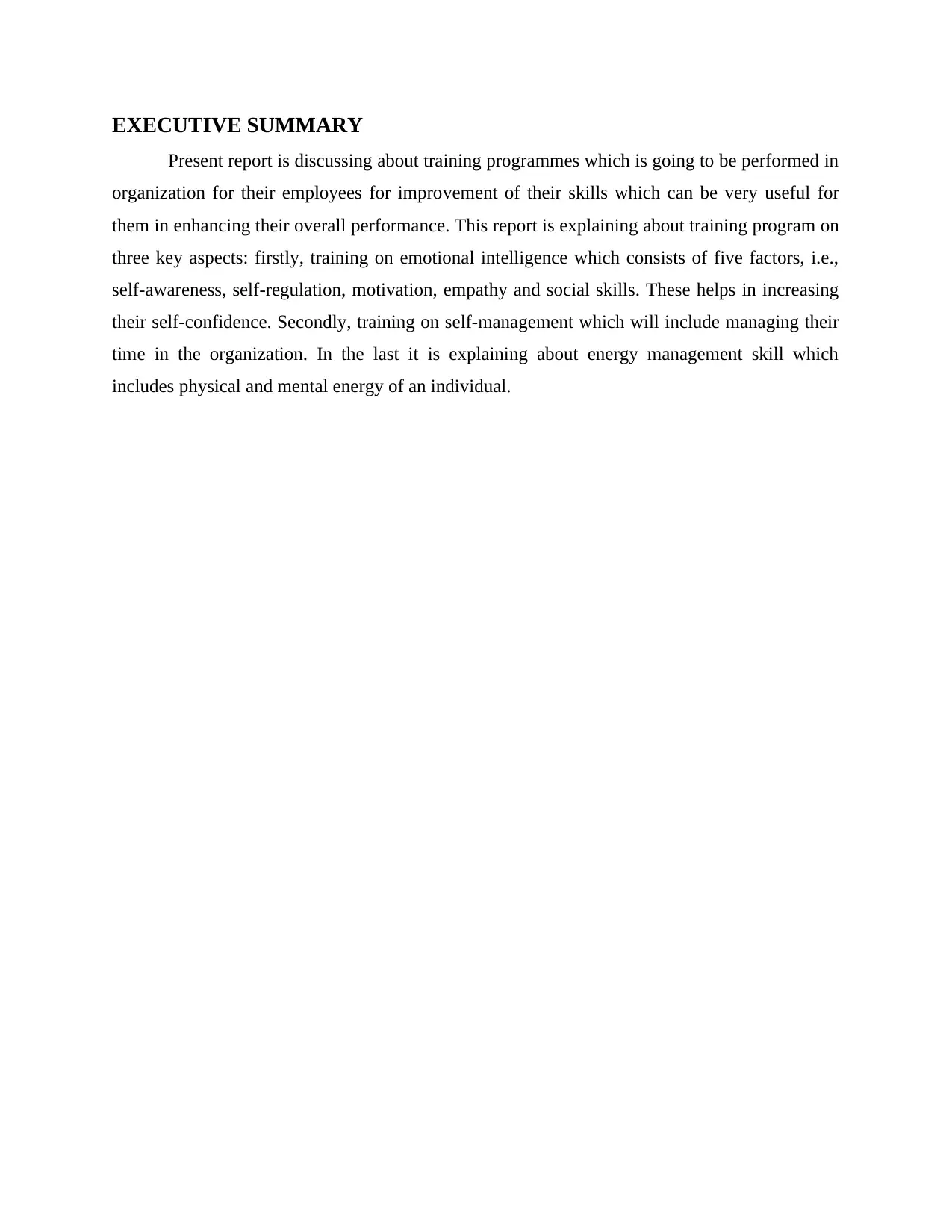
EXECUTIVE SUMMARY
Present report is discussing about training programmes which is going to be performed in
organization for their employees for improvement of their skills which can be very useful for
them in enhancing their overall performance. This report is explaining about training program on
three key aspects: firstly, training on emotional intelligence which consists of five factors, i.e.,
self-awareness, self-regulation, motivation, empathy and social skills. These helps in increasing
their self-confidence. Secondly, training on self-management which will include managing their
time in the organization. In the last it is explaining about energy management skill which
includes physical and mental energy of an individual.
Present report is discussing about training programmes which is going to be performed in
organization for their employees for improvement of their skills which can be very useful for
them in enhancing their overall performance. This report is explaining about training program on
three key aspects: firstly, training on emotional intelligence which consists of five factors, i.e.,
self-awareness, self-regulation, motivation, empathy and social skills. These helps in increasing
their self-confidence. Secondly, training on self-management which will include managing their
time in the organization. In the last it is explaining about energy management skill which
includes physical and mental energy of an individual.
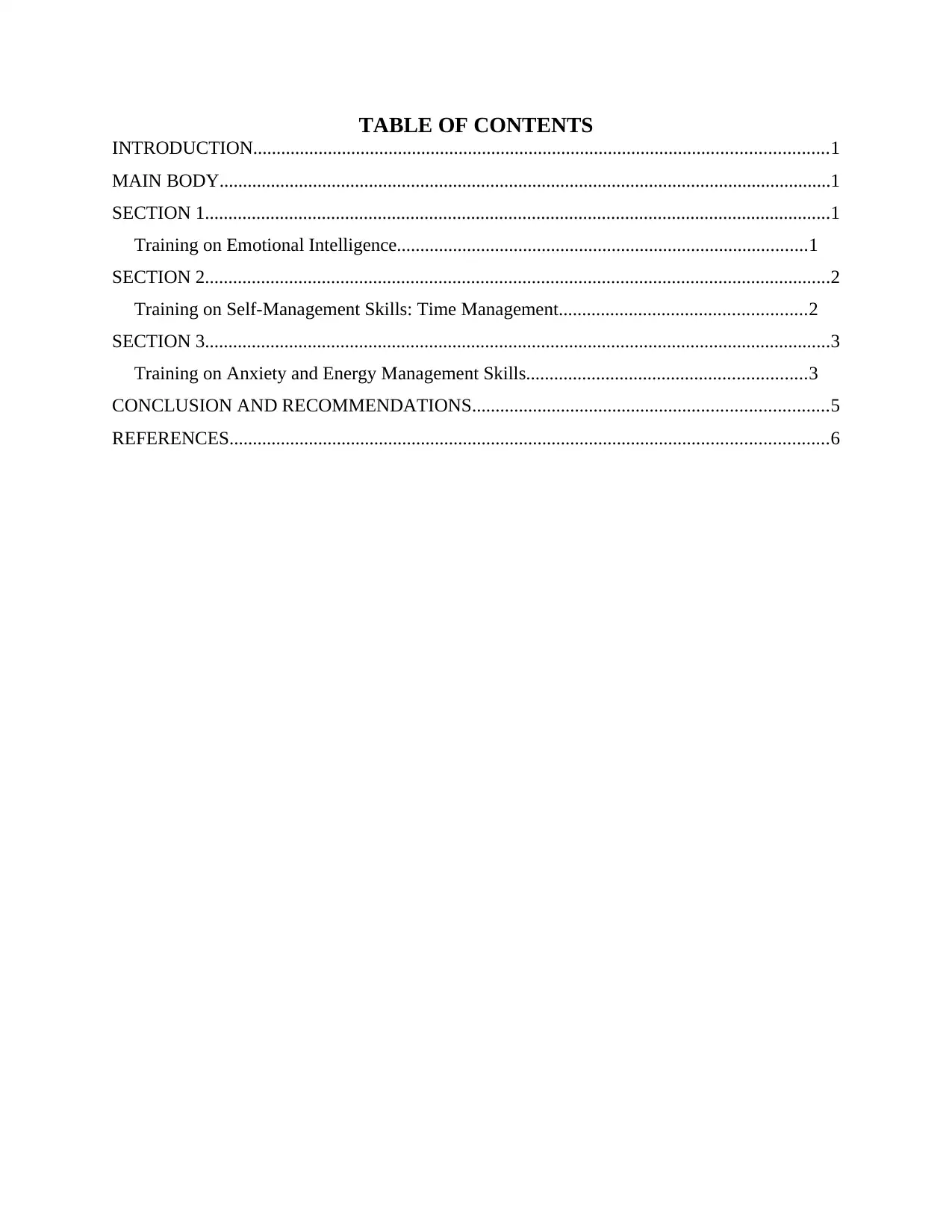
TABLE OF CONTENTS
INTRODUCTION...........................................................................................................................1
MAIN BODY...................................................................................................................................1
SECTION 1......................................................................................................................................1
Training on Emotional Intelligence........................................................................................1
SECTION 2......................................................................................................................................2
Training on Self-Management Skills: Time Management.....................................................2
SECTION 3......................................................................................................................................3
Training on Anxiety and Energy Management Skills............................................................3
CONCLUSION AND RECOMMENDATIONS............................................................................5
REFERENCES................................................................................................................................6
INTRODUCTION...........................................................................................................................1
MAIN BODY...................................................................................................................................1
SECTION 1......................................................................................................................................1
Training on Emotional Intelligence........................................................................................1
SECTION 2......................................................................................................................................2
Training on Self-Management Skills: Time Management.....................................................2
SECTION 3......................................................................................................................................3
Training on Anxiety and Energy Management Skills............................................................3
CONCLUSION AND RECOMMENDATIONS............................................................................5
REFERENCES................................................................................................................................6
⊘ This is a preview!⊘
Do you want full access?
Subscribe today to unlock all pages.

Trusted by 1+ million students worldwide
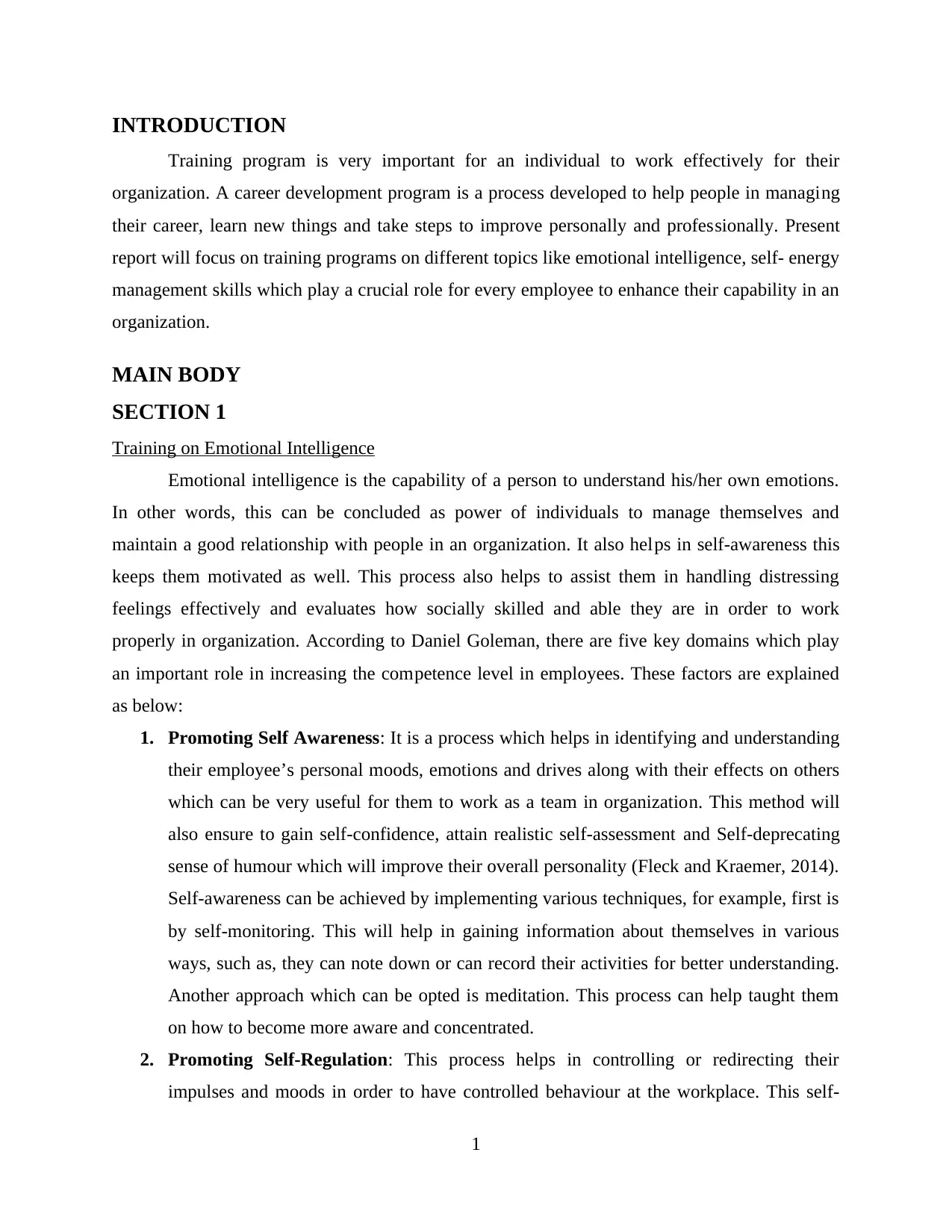
INTRODUCTION
Training program is very important for an individual to work effectively for their
organization. A career development program is a process developed to help people in managing
their career, learn new things and take steps to improve personally and professionally. Present
report will focus on training programs on different topics like emotional intelligence, self- energy
management skills which play a crucial role for every employee to enhance their capability in an
organization.
MAIN BODY
SECTION 1
Training on Emotional Intelligence
Emotional intelligence is the capability of a person to understand his/her own emotions.
In other words, this can be concluded as power of individuals to manage themselves and
maintain a good relationship with people in an organization. It also helps in self-awareness this
keeps them motivated as well. This process also helps to assist them in handling distressing
feelings effectively and evaluates how socially skilled and able they are in order to work
properly in organization. According to Daniel Goleman, there are five key domains which play
an important role in increasing the competence level in employees. These factors are explained
as below:
1. Promoting Self Awareness: It is a process which helps in identifying and understanding
their employee’s personal moods, emotions and drives along with their effects on others
which can be very useful for them to work as a team in organization. This method will
also ensure to gain self-confidence, attain realistic self-assessment and Self-deprecating
sense of humour which will improve their overall personality (Fleck and Kraemer, 2014).
Self-awareness can be achieved by implementing various techniques, for example, first is
by self-monitoring. This will help in gaining information about themselves in various
ways, such as, they can note down or can record their activities for better understanding.
Another approach which can be opted is meditation. This process can help taught them
on how to become more aware and concentrated.
2. Promoting Self-Regulation: This process helps in controlling or redirecting their
impulses and moods in order to have controlled behaviour at the workplace. This self-
1
Training program is very important for an individual to work effectively for their
organization. A career development program is a process developed to help people in managing
their career, learn new things and take steps to improve personally and professionally. Present
report will focus on training programs on different topics like emotional intelligence, self- energy
management skills which play a crucial role for every employee to enhance their capability in an
organization.
MAIN BODY
SECTION 1
Training on Emotional Intelligence
Emotional intelligence is the capability of a person to understand his/her own emotions.
In other words, this can be concluded as power of individuals to manage themselves and
maintain a good relationship with people in an organization. It also helps in self-awareness this
keeps them motivated as well. This process also helps to assist them in handling distressing
feelings effectively and evaluates how socially skilled and able they are in order to work
properly in organization. According to Daniel Goleman, there are five key domains which play
an important role in increasing the competence level in employees. These factors are explained
as below:
1. Promoting Self Awareness: It is a process which helps in identifying and understanding
their employee’s personal moods, emotions and drives along with their effects on others
which can be very useful for them to work as a team in organization. This method will
also ensure to gain self-confidence, attain realistic self-assessment and Self-deprecating
sense of humour which will improve their overall personality (Fleck and Kraemer, 2014).
Self-awareness can be achieved by implementing various techniques, for example, first is
by self-monitoring. This will help in gaining information about themselves in various
ways, such as, they can note down or can record their activities for better understanding.
Another approach which can be opted is meditation. This process can help taught them
on how to become more aware and concentrated.
2. Promoting Self-Regulation: This process helps in controlling or redirecting their
impulses and moods in order to have controlled behaviour at the workplace. This self-
1
Paraphrase This Document
Need a fresh take? Get an instant paraphrase of this document with our AI Paraphraser
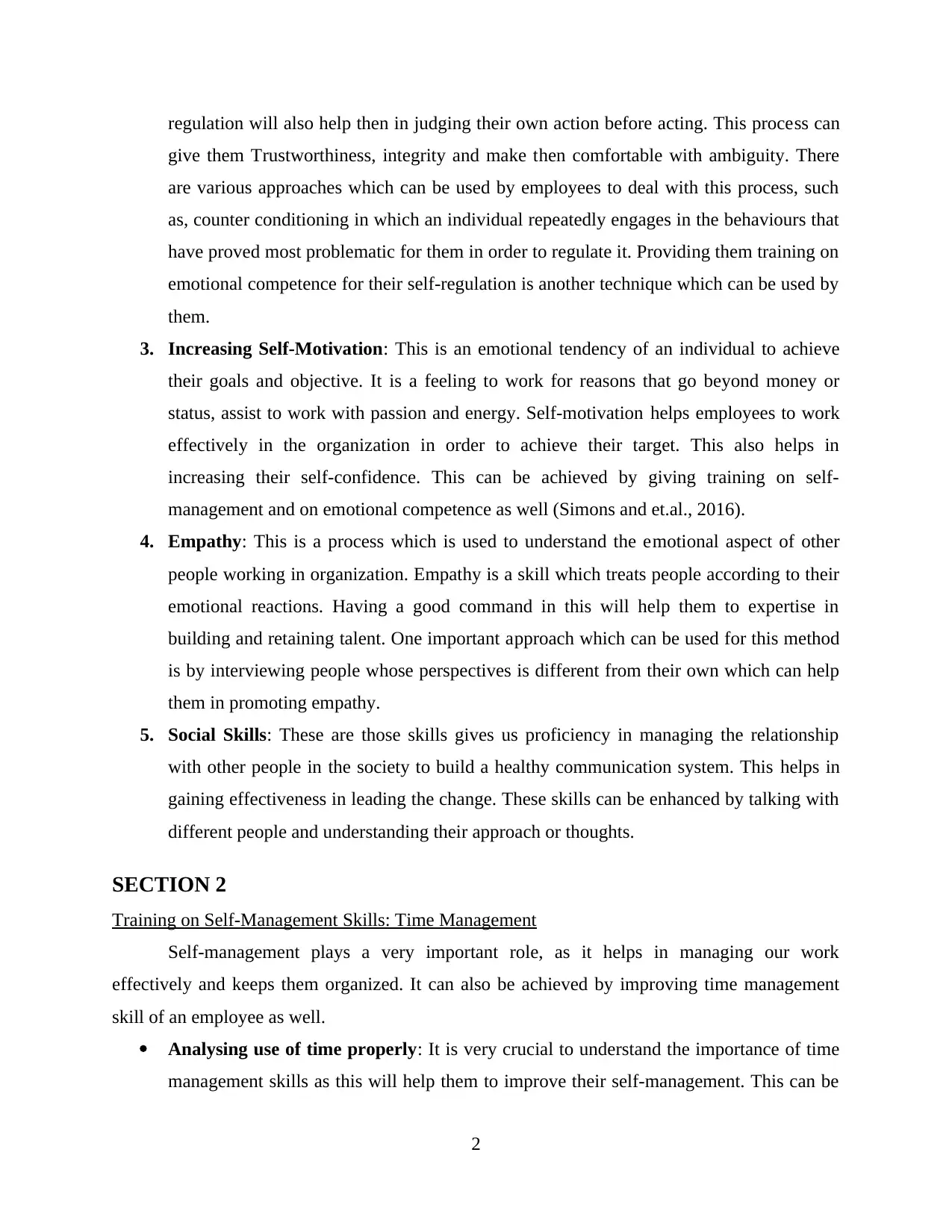
regulation will also help then in judging their own action before acting. This process can
give them Trustworthiness, integrity and make then comfortable with ambiguity. There
are various approaches which can be used by employees to deal with this process, such
as, counter conditioning in which an individual repeatedly engages in the behaviours that
have proved most problematic for them in order to regulate it. Providing them training on
emotional competence for their self-regulation is another technique which can be used by
them.
3. Increasing Self-Motivation: This is an emotional tendency of an individual to achieve
their goals and objective. It is a feeling to work for reasons that go beyond money or
status, assist to work with passion and energy. Self-motivation helps employees to work
effectively in the organization in order to achieve their target. This also helps in
increasing their self-confidence. This can be achieved by giving training on self-
management and on emotional competence as well (Simons and et.al., 2016).
4. Empathy: This is a process which is used to understand the emotional aspect of other
people working in organization. Empathy is a skill which treats people according to their
emotional reactions. Having a good command in this will help them to expertise in
building and retaining talent. One important approach which can be used for this method
is by interviewing people whose perspectives is different from their own which can help
them in promoting empathy.
5. Social Skills: These are those skills gives us proficiency in managing the relationship
with other people in the society to build a healthy communication system. This helps in
gaining effectiveness in leading the change. These skills can be enhanced by talking with
different people and understanding their approach or thoughts.
SECTION 2
Training on Self-Management Skills: Time Management
Self-management plays a very important role, as it helps in managing our work
effectively and keeps them organized. It can also be achieved by improving time management
skill of an employee as well.
Analysing use of time properly: It is very crucial to understand the importance of time
management skills as this will help them to improve their self-management. This can be
2
give them Trustworthiness, integrity and make then comfortable with ambiguity. There
are various approaches which can be used by employees to deal with this process, such
as, counter conditioning in which an individual repeatedly engages in the behaviours that
have proved most problematic for them in order to regulate it. Providing them training on
emotional competence for their self-regulation is another technique which can be used by
them.
3. Increasing Self-Motivation: This is an emotional tendency of an individual to achieve
their goals and objective. It is a feeling to work for reasons that go beyond money or
status, assist to work with passion and energy. Self-motivation helps employees to work
effectively in the organization in order to achieve their target. This also helps in
increasing their self-confidence. This can be achieved by giving training on self-
management and on emotional competence as well (Simons and et.al., 2016).
4. Empathy: This is a process which is used to understand the emotional aspect of other
people working in organization. Empathy is a skill which treats people according to their
emotional reactions. Having a good command in this will help them to expertise in
building and retaining talent. One important approach which can be used for this method
is by interviewing people whose perspectives is different from their own which can help
them in promoting empathy.
5. Social Skills: These are those skills gives us proficiency in managing the relationship
with other people in the society to build a healthy communication system. This helps in
gaining effectiveness in leading the change. These skills can be enhanced by talking with
different people and understanding their approach or thoughts.
SECTION 2
Training on Self-Management Skills: Time Management
Self-management plays a very important role, as it helps in managing our work
effectively and keeps them organized. It can also be achieved by improving time management
skill of an employee as well.
Analysing use of time properly: It is very crucial to understand the importance of time
management skills as this will help them to improve their self-management. This can be
2
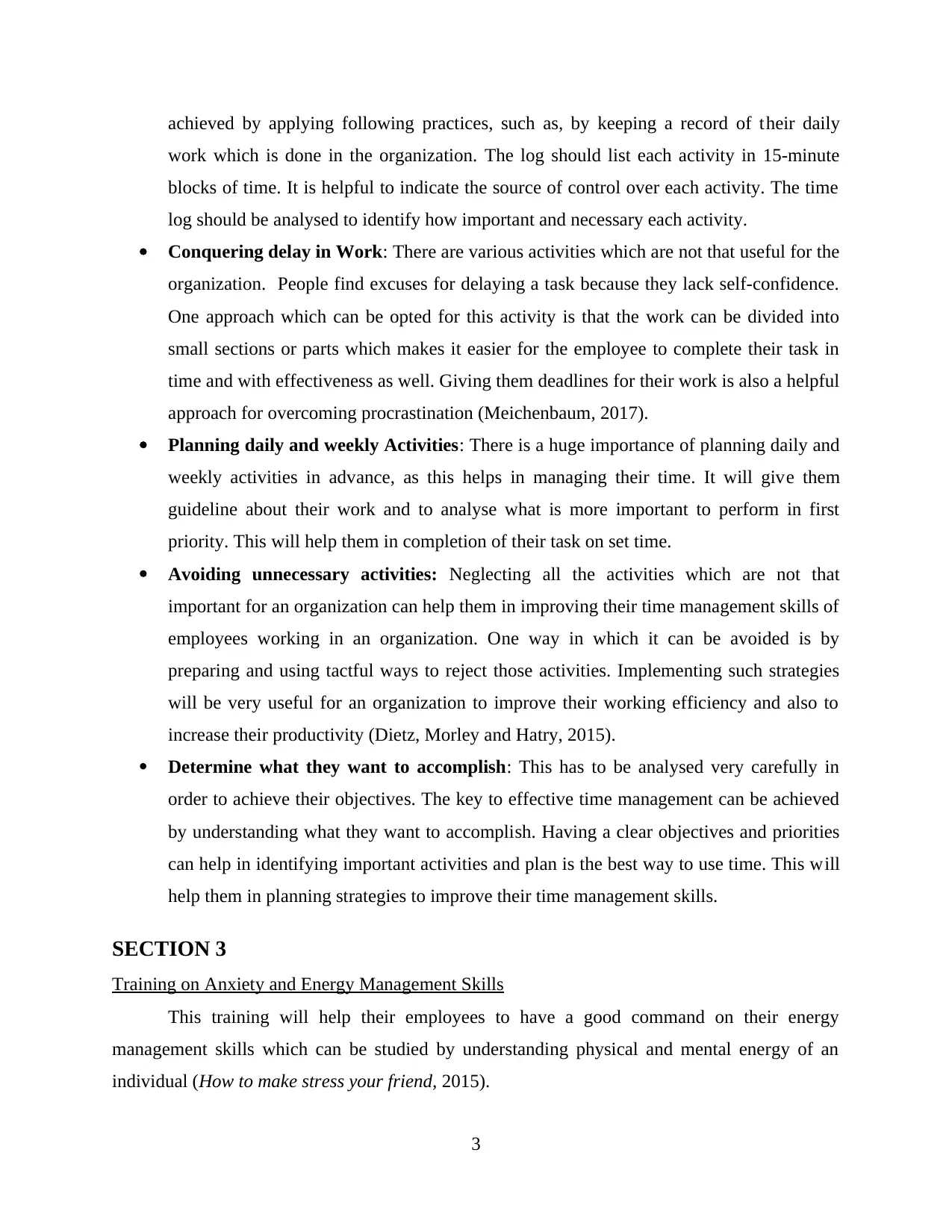
achieved by applying following practices, such as, by keeping a record of their daily
work which is done in the organization. The log should list each activity in 15-minute
blocks of time. It is helpful to indicate the source of control over each activity. The time
log should be analysed to identify how important and necessary each activity.
Conquering delay in Work: There are various activities which are not that useful for the
organization. People find excuses for delaying a task because they lack self-confidence.
One approach which can be opted for this activity is that the work can be divided into
small sections or parts which makes it easier for the employee to complete their task in
time and with effectiveness as well. Giving them deadlines for their work is also a helpful
approach for overcoming procrastination (Meichenbaum, 2017).
Planning daily and weekly Activities: There is a huge importance of planning daily and
weekly activities in advance, as this helps in managing their time. It will give them
guideline about their work and to analyse what is more important to perform in first
priority. This will help them in completion of their task on set time.
Avoiding unnecessary activities: Neglecting all the activities which are not that
important for an organization can help them in improving their time management skills of
employees working in an organization. One way in which it can be avoided is by
preparing and using tactful ways to reject those activities. Implementing such strategies
will be very useful for an organization to improve their working efficiency and also to
increase their productivity (Dietz, Morley and Hatry, 2015).
Determine what they want to accomplish: This has to be analysed very carefully in
order to achieve their objectives. The key to effective time management can be achieved
by understanding what they want to accomplish. Having a clear objectives and priorities
can help in identifying important activities and plan is the best way to use time. This will
help them in planning strategies to improve their time management skills.
SECTION 3
Training on Anxiety and Energy Management Skills
This training will help their employees to have a good command on their energy
management skills which can be studied by understanding physical and mental energy of an
individual (How to make stress your friend, 2015).
3
work which is done in the organization. The log should list each activity in 15-minute
blocks of time. It is helpful to indicate the source of control over each activity. The time
log should be analysed to identify how important and necessary each activity.
Conquering delay in Work: There are various activities which are not that useful for the
organization. People find excuses for delaying a task because they lack self-confidence.
One approach which can be opted for this activity is that the work can be divided into
small sections or parts which makes it easier for the employee to complete their task in
time and with effectiveness as well. Giving them deadlines for their work is also a helpful
approach for overcoming procrastination (Meichenbaum, 2017).
Planning daily and weekly Activities: There is a huge importance of planning daily and
weekly activities in advance, as this helps in managing their time. It will give them
guideline about their work and to analyse what is more important to perform in first
priority. This will help them in completion of their task on set time.
Avoiding unnecessary activities: Neglecting all the activities which are not that
important for an organization can help them in improving their time management skills of
employees working in an organization. One way in which it can be avoided is by
preparing and using tactful ways to reject those activities. Implementing such strategies
will be very useful for an organization to improve their working efficiency and also to
increase their productivity (Dietz, Morley and Hatry, 2015).
Determine what they want to accomplish: This has to be analysed very carefully in
order to achieve their objectives. The key to effective time management can be achieved
by understanding what they want to accomplish. Having a clear objectives and priorities
can help in identifying important activities and plan is the best way to use time. This will
help them in planning strategies to improve their time management skills.
SECTION 3
Training on Anxiety and Energy Management Skills
This training will help their employees to have a good command on their energy
management skills which can be studied by understanding physical and mental energy of an
individual (How to make stress your friend, 2015).
3
⊘ This is a preview!⊘
Do you want full access?
Subscribe today to unlock all pages.

Trusted by 1+ million students worldwide
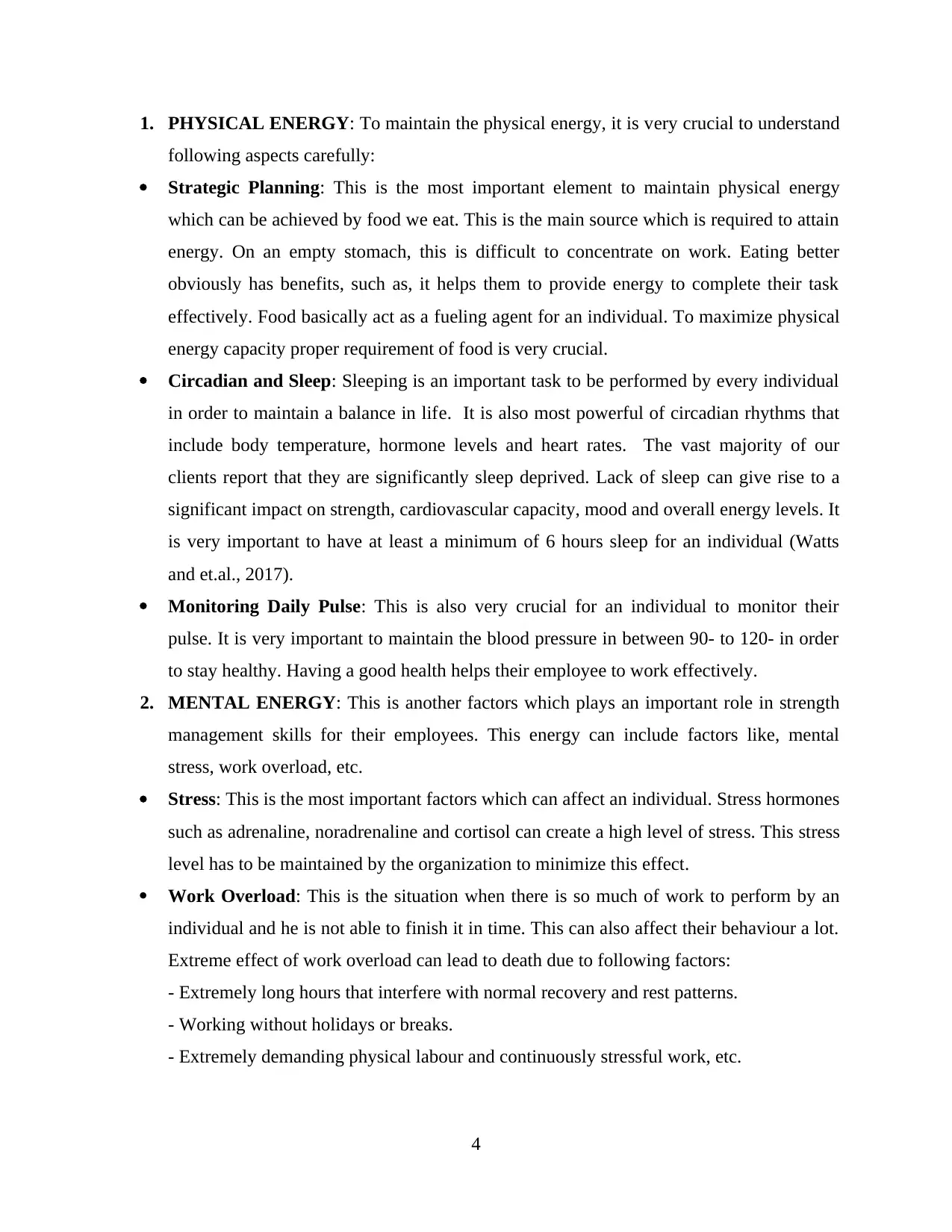
1. PHYSICAL ENERGY: To maintain the physical energy, it is very crucial to understand
following aspects carefully:
Strategic Planning: This is the most important element to maintain physical energy
which can be achieved by food we eat. This is the main source which is required to attain
energy. On an empty stomach, this is difficult to concentrate on work. Eating better
obviously has benefits, such as, it helps them to provide energy to complete their task
effectively. Food basically act as a fueling agent for an individual. To maximize physical
energy capacity proper requirement of food is very crucial.
Circadian and Sleep: Sleeping is an important task to be performed by every individual
in order to maintain a balance in life. It is also most powerful of circadian rhythms that
include body temperature, hormone levels and heart rates. The vast majority of our
clients report that they are significantly sleep deprived. Lack of sleep can give rise to a
significant impact on strength, cardiovascular capacity, mood and overall energy levels. It
is very important to have at least a minimum of 6 hours sleep for an individual (Watts
and et.al., 2017).
Monitoring Daily Pulse: This is also very crucial for an individual to monitor their
pulse. It is very important to maintain the blood pressure in between 90- to 120- in order
to stay healthy. Having a good health helps their employee to work effectively.
2. MENTAL ENERGY: This is another factors which plays an important role in strength
management skills for their employees. This energy can include factors like, mental
stress, work overload, etc.
Stress: This is the most important factors which can affect an individual. Stress hormones
such as adrenaline, noradrenaline and cortisol can create a high level of stress. This stress
level has to be maintained by the organization to minimize this effect.
Work Overload: This is the situation when there is so much of work to perform by an
individual and he is not able to finish it in time. This can also affect their behaviour a lot.
Extreme effect of work overload can lead to death due to following factors:
- Extremely long hours that interfere with normal recovery and rest patterns.
- Working without holidays or breaks.
- Extremely demanding physical labour and continuously stressful work, etc.
4
following aspects carefully:
Strategic Planning: This is the most important element to maintain physical energy
which can be achieved by food we eat. This is the main source which is required to attain
energy. On an empty stomach, this is difficult to concentrate on work. Eating better
obviously has benefits, such as, it helps them to provide energy to complete their task
effectively. Food basically act as a fueling agent for an individual. To maximize physical
energy capacity proper requirement of food is very crucial.
Circadian and Sleep: Sleeping is an important task to be performed by every individual
in order to maintain a balance in life. It is also most powerful of circadian rhythms that
include body temperature, hormone levels and heart rates. The vast majority of our
clients report that they are significantly sleep deprived. Lack of sleep can give rise to a
significant impact on strength, cardiovascular capacity, mood and overall energy levels. It
is very important to have at least a minimum of 6 hours sleep for an individual (Watts
and et.al., 2017).
Monitoring Daily Pulse: This is also very crucial for an individual to monitor their
pulse. It is very important to maintain the blood pressure in between 90- to 120- in order
to stay healthy. Having a good health helps their employee to work effectively.
2. MENTAL ENERGY: This is another factors which plays an important role in strength
management skills for their employees. This energy can include factors like, mental
stress, work overload, etc.
Stress: This is the most important factors which can affect an individual. Stress hormones
such as adrenaline, noradrenaline and cortisol can create a high level of stress. This stress
level has to be maintained by the organization to minimize this effect.
Work Overload: This is the situation when there is so much of work to perform by an
individual and he is not able to finish it in time. This can also affect their behaviour a lot.
Extreme effect of work overload can lead to death due to following factors:
- Extremely long hours that interfere with normal recovery and rest patterns.
- Working without holidays or breaks.
- Extremely demanding physical labour and continuously stressful work, etc.
4
Paraphrase This Document
Need a fresh take? Get an instant paraphrase of this document with our AI Paraphraser
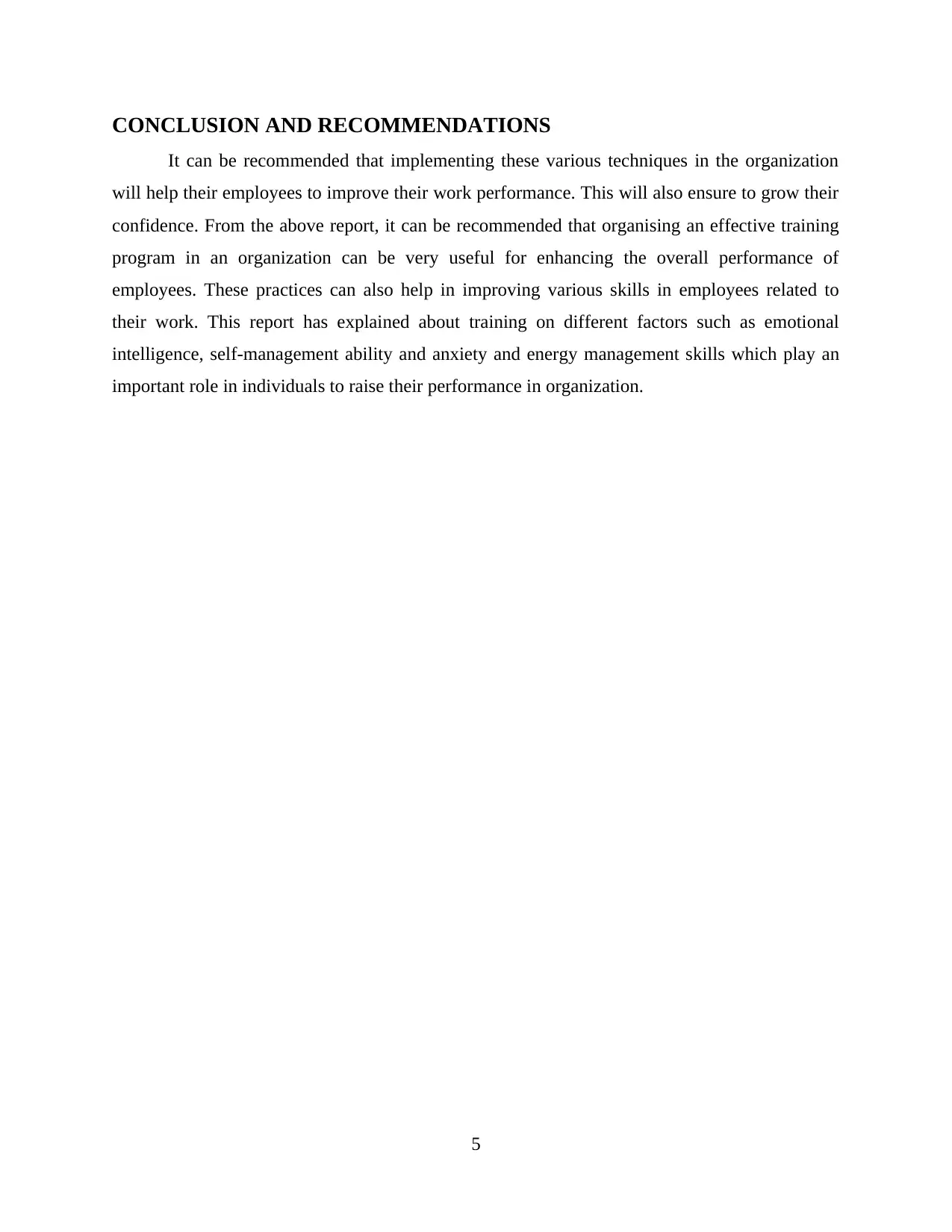
CONCLUSION AND RECOMMENDATIONS
It can be recommended that implementing these various techniques in the organization
will help their employees to improve their work performance. This will also ensure to grow their
confidence. From the above report, it can be recommended that organising an effective training
program in an organization can be very useful for enhancing the overall performance of
employees. These practices can also help in improving various skills in employees related to
their work. This report has explained about training on different factors such as emotional
intelligence, self-management ability and anxiety and energy management skills which play an
important role in individuals to raise their performance in organization.
5
It can be recommended that implementing these various techniques in the organization
will help their employees to improve their work performance. This will also ensure to grow their
confidence. From the above report, it can be recommended that organising an effective training
program in an organization can be very useful for enhancing the overall performance of
employees. These practices can also help in improving various skills in employees related to
their work. This report has explained about training on different factors such as emotional
intelligence, self-management ability and anxiety and energy management skills which play an
important role in individuals to raise their performance in organization.
5
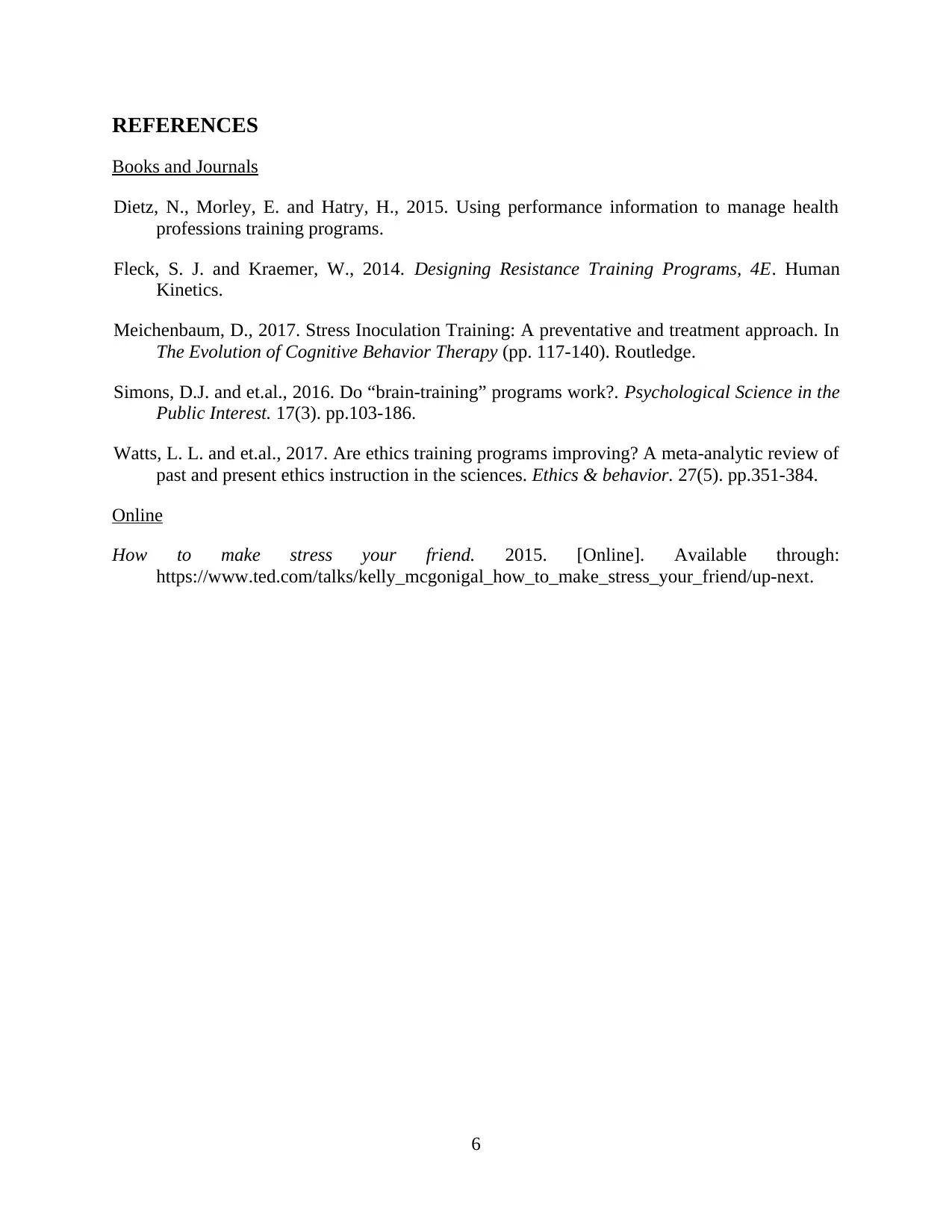
REFERENCES
Books and Journals
Dietz, N., Morley, E. and Hatry, H., 2015. Using performance information to manage health
professions training programs.
Fleck, S. J. and Kraemer, W., 2014. Designing Resistance Training Programs, 4E. Human
Kinetics.
Meichenbaum, D., 2017. Stress Inoculation Training: A preventative and treatment approach. In
The Evolution of Cognitive Behavior Therapy (pp. 117-140). Routledge.
Simons, D.J. and et.al., 2016. Do “brain-training” programs work?. Psychological Science in the
Public Interest. 17(3). pp.103-186.
Watts, L. L. and et.al., 2017. Are ethics training programs improving? A meta-analytic review of
past and present ethics instruction in the sciences. Ethics & behavior. 27(5). pp.351-384.
Online
How to make stress your friend. 2015. [Online]. Available through:
https://www.ted.com/talks/kelly_mcgonigal_how_to_make_stress_your_friend/up-next.
6
Books and Journals
Dietz, N., Morley, E. and Hatry, H., 2015. Using performance information to manage health
professions training programs.
Fleck, S. J. and Kraemer, W., 2014. Designing Resistance Training Programs, 4E. Human
Kinetics.
Meichenbaum, D., 2017. Stress Inoculation Training: A preventative and treatment approach. In
The Evolution of Cognitive Behavior Therapy (pp. 117-140). Routledge.
Simons, D.J. and et.al., 2016. Do “brain-training” programs work?. Psychological Science in the
Public Interest. 17(3). pp.103-186.
Watts, L. L. and et.al., 2017. Are ethics training programs improving? A meta-analytic review of
past and present ethics instruction in the sciences. Ethics & behavior. 27(5). pp.351-384.
Online
How to make stress your friend. 2015. [Online]. Available through:
https://www.ted.com/talks/kelly_mcgonigal_how_to_make_stress_your_friend/up-next.
6
⊘ This is a preview!⊘
Do you want full access?
Subscribe today to unlock all pages.

Trusted by 1+ million students worldwide
1 out of 9
Related Documents
Your All-in-One AI-Powered Toolkit for Academic Success.
+13062052269
info@desklib.com
Available 24*7 on WhatsApp / Email
![[object Object]](/_next/static/media/star-bottom.7253800d.svg)
Unlock your academic potential
Copyright © 2020–2026 A2Z Services. All Rights Reserved. Developed and managed by ZUCOL.





